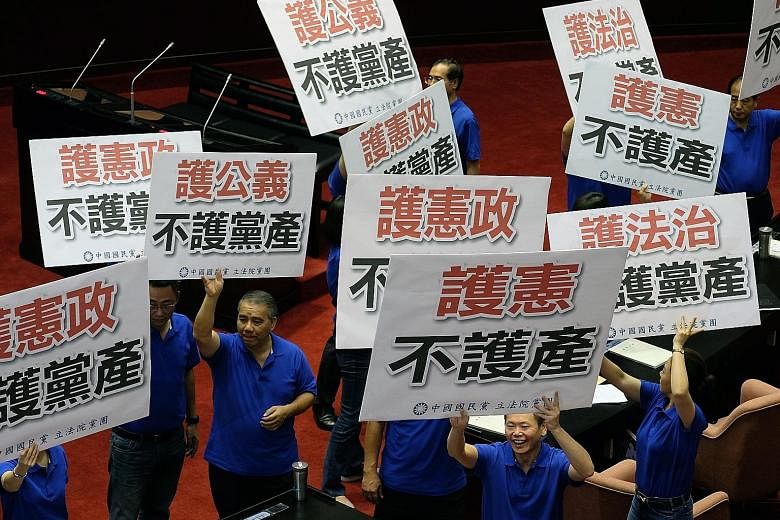Two companies were scrutinised yesterday by a high-level committee to find out if they are linked to the opposition Kuomintang (KMT) party, as part of a wider probe into the assets worth NT$16 billion (S$700 million) of one of the richest political parties in the world.
In its first public hearing yesterday, the Ill-gotten Party Assets Settlement Committee sought to determine if Central Investment Co and Hsinyutai Co are KMT-affiliate organisations, and if both firms' five shareholders are KMT trustees.
If that is the case, the firms' shares may have to be handed to the government under the new "ill-gotten assets" law.
The KMT must submit documents to prove the legitimacy of the assets to the committee, which will then determine if they should be surrendered.
But the seven-hour hearing yielded few answers. Central Investment chairman Gordon Chen, who took over the helm last year, was unable to answer questions on the firm's transactions that dated as far back as the 1960s and 1970s.
The line of questioning sparked protests from representatives of the KMT and the companies, who accused the 11-member committee of treating the proceedings "like an inquisition".
They also complained that the KMT and the two companies were not given enough time to prepare for the hearing.
-
KMT'S NT$16 BILLION KITTY
-
870
Plots of land including shares in the Pacific island of Palau.
-
2
Allegedly KMT-linked companies under probe.
-
152
Buildings across the island and overseas, including the nine-storey Taiwan Trade Development building in Tokyo valued at 4.5 billion yen (S$59.5 million).
One representative even walked out midway through the hearing that was streamed live on the committee's website yesterday.
KMT member and Yunlin Technology University law professor Wu Wei-chi, who walked out in protest, told reporters: "The line of questioning from the panel is unfair and oppressive.
"It is not possible to remember accounts from such a long time ago and if we don't have the answers to the questions, it cannot be assumed that the transactions are improper."
The committee comprises scholars, former lawmakers and experts.
The investigation into whether the KMT had inappropriately amassed its assets is part of the transitional justice that President Tsai Ing-wen called for in her inauguration speech in May.
Two months later, the law was passed by Parliament, which Ms Tsai's Democratic Progressive Party (DPP) has majority control, authorising the government to go after political parties with "ill-gotten" assets obtained after 1945.
But the probe is aimed primarily at the KMT. The DPP believes that much of the party's assets was improperly obtained during the period of authoritarian KMT rule from 1945 to 1987.
The DPP, which has assets worth only a fraction of the KMT's, has for a long time challenged the legitimacy of the KMT's assets. It has sought to pass the Bill to scrutinise them since 2002 when President Chen Shui-bian of the DPP was in office.
But those efforts stalled as the DPP did not have legislative majority. When the KMT's Ma Ying-jeou became President in 2008, he dropped the Bill.
This time round, with a DPP-majority Parliament, the path to take the KMT to task is easier.
So far, the committee has frozen two KMT bank accounts, preventing it from cashing out cheques worth NT$520 million to pay staff wages and party expenses.
Some analysts see the probe as a way to bring about the demise of the party which lost both its legislative majority and the presidency in the January polls.
National Sun Yat Sen University political scientist Liao Da-chi said: "First, it suffered one of its worst electoral losses, then now its assets could possibly be confiscated. With limited resources, it is going to be hard for the KMT to reinvigorate its rank and file, and focus on preparing for future elections."
But the KMT is prepared to do all it can to stay in the political fray. It is applying for a judicial review to determine if the ill-gotten gains law violates the island's Constitution.
KMT's Culture and Communications Committee director Chow Chi-wai told The Straits Times: "We have been tested before and have emerged stronger. This is no different. We will continue to fight for our right to be the check and balance for the government and for Taiwan's democracy."
No date has been set for the next hearing.

